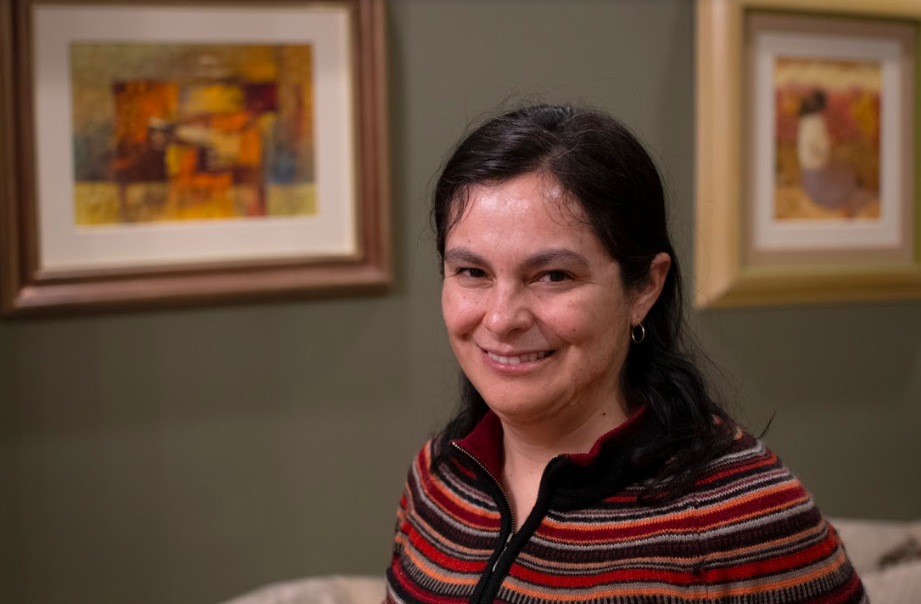María Inés Casana


J.V: Queremos saber un poco sobre su familia y su trabajo…
M.I.C.: Yo llegué acá en los Estados Unidos en dos mil ocho. Soy peruana, mi esposo es peruano pero emigró a los Estados Unidos cuando tenía doce. Entonces, estudió en la universidad en Perú. Antes de emigrar, yo estudiaba con mi hermana en la universidad de Lima. Allí conocí a mi esposo y él terminó sus estudios y regresó a los Estados Unidos para trabajar. Empezamos a estar en una relación por dos años de lejos. Yo todavía estaba en la universidad, entonces mi novio dijo que vamos a casarnos para no estar en una relación a larga distancia. Así entonces terminé la universidad allí y decidimos casarnos. Entonces nos casamos y entre los Estados Unidos como una novia legalmente. Decidí aprender inglés porque mi inglés era muy básico, no sabía casi nada. Llegué en agosto en el dos mil y ocho y en septiembre estudié inglés como una segunda lengua en la universidad de Western Kentucky y en diciembre empecé a estudiar para el GMAT. Justo, entonces estuve embarazada, después de dos años de maestría, tuve mi hija y terminé en diciembre de dos mil diez la maestría y en dos mil once empecé a trabajar en Fruit of the Loom. Mi segunda hija tiene diez años y mi hijo mayor tiene diecinueve años y va Western. Mi esposo también trabaja en Fruit of the Loom.
J.V.: ¿Cómo su vida en Perú tiene un impacto en su vida aquí en los EEUU?
M.I.C.: Al principio fue difícil. Tuve mis amigos de la universidad y mi familia allí. Pero aquí no conocía a nadie. Al principio fue duro pero fue bueno porque asistía a la universidad y batallaba más o menos con mi inglés y lo que me ayudó fue la familia de mi esposo. La mayoría de mi círculo son hispanos. Si es algo que tiene una fiesta es más con mis amigos hispanos. Es una parte de mi cultura.
J.V.: ¿Qué es lo que más extraña de su país?
M.I.C.: Mi familia, mi familia.
J.V.: Entonces, ¿toda su familia está en Perú?
M.I.C.: La mayoría. Mi hermana acá en Denver, pero tengo dos hermanos que están en Perú. Mi papá falleció hace tres años, pero tengo muchas tías y tíos y todo en Perú. Es lo que más extraño.
D.J.: ¿Dónde vivió en Perú?
M.I.C.: De niña, en una ciudad del norte, que se llama Cajamarca que está en las montañas. Pero para hacer la universidad, fui a Lima...[La cual] visito una vez al año.
D.J.: ¿Cómo han afectado los derechos humanos a su transición a los Estados Unidos?
M.I.C.: No tenía ningún efecto porque yo entre legalmente. Yo llegué como novia. Yo llegué y a los tres meses ya tenía la Green Card y después de dos años fui una ciudadana. En la parte legal, no tenía ningún problema. Legalmente, en la parte de los derechos humanos, no me ha afectado.”
D.J.: ¿Ha experimentado algún reto en Kentucky?
M.I.C.: Si, el idioma al principio. Tal vez, entendía más, pero no quería hablar. En la universidad ellos sabían que era estudiante internacional y me ayudaban. Para hablar una conversación continua, empecé a hacerlo en el trabajo. Mi problema fue cuando yo empecé en el Departamento de Compras en Fruit of the Loom. Cada vez que me llamaban por teléfono, no entendía nada. Nada, al principio fue difícil. Mi esposo me sugirió enviar correos. Fue mas fácil. ¿Qué más? La parte de conocer amigos fuera del círculo de mi familia.
J.V.: “¿Cual es la área de especialización de su hijo?”
M.I.C.: Justo, ha pasado por todo, empezó con contabilidad y cambió a pre-medicina y ahora está con pre-leyes. No sé qué va a terminar. Pero está haciendo también su especialidad en español. Lo habla pero no escribe formalmente. Él habla más que mi hija, cuando vamos a Perú de vacación, está hablando más. Ahora está en su clase de español y está practicando pero, normalmente cuando estamos hablando en español, responde en inglés. Cuándo texteo, siempre mando los textos en español, pero él siempre me responde en inglés. Pero ahora, me responde en español porque está tomando una clase y quiere practicar, no sé.
The immigration process can be difficult because it includes coming to a new country, leaving your family and friends, learning a new culture and a new language. We had the opportunity to interview María, who is from Peru and came to the U.S. in 2008 because of her husband of 21 years. Her husband is from Peru too, but he came to the U.S. when he was 12 years old. The couple work at Fruit of the Loom and have two children together When Maria began telling us her story, it became very clear that there are many things that we take for granted in the U.S. We are so accustomed to comfort and familiarity, that doing something “difficult” is avoided or becomes a fiasco of complaints. Someone who leaves her country of origin to be with the one she loves, leaves her family, learns a completely new language and starts a new life, has earned our utmost respect. Someone like María Inés Casana.
J.V.: We want to know a little bit about your family and your job...
M.I.C.: I arrived to the United States in 2008. I am from Peru, and I’m married to my husband who is also Peruvian. He immigrated to the U.S. when he was twelve years old. I studied at the University of Lima with my sister and that is also where I met my husband. He finished his studies and went back to the U.S. to work and we began to date. We maintained a long-distance relationship for two years. After I finished my studies at the University, we decided to get married. We got married here in Peru because we had to have a religious ceremony. I came into the U.S. as a fiancée, so I entered legally. My husband worked here in Bowling Green and when I first arrived I began to attend Western Kentucky University to learn English because my English was very basic; I knew almost nothing. I arrived to the U.S. in August, 2008 and in September I started taking classes at the University and I studied English as a Second Language and in December I started my GMAT exam. After two years of graduate school, I became pregnant with second child and already had my son. It took two years to get my Master’s, but I finished in 2010 and began working at Fruit of the Loom in 2011. Now, my oldest he is 19 years old and attends Western, and my daughter is 10 years old. My husband also works at Fruit of the Loom.
J.V.: How does your life in Peru have an impact on your life here in the U.S.?
M.I.C.: At first it was hard. My friends and family were there [in Peru]. But here I didn’t know anybody. At first it was hard because when I went to WKU and fought more or less with my English. My husband’s family helped me a lot and made me feel comfortable. Most of my friends I’ve made here are Hispanic. It’s something that if I host a party it’s with my Hispanic friends, it’s just a part of my culture.
J.V.: What do you miss the most about Peru?
M.I.C.: I miss my family the most. My family.
J.V.: So all of your family is in Peru?
M.I.C.: Mostly. My sister is here in Denver, but my brothers and my mother are still in Peru. My father passed away three years ago. I have many aunts and uncles that are still there, I have a lot of family that is still there.
D.J.: Where did you live in Peru?
M.I.C.: When I was little, I lived in a northern city named Cajamarca which is in the mountains, but when I went to study at the University I went to Lima. I visit my family in Peru once a year.
D.J.: How have human rights affected your transition to the United States?
M.I.C.: “I did not have any problems because I entered legally, I entered as a fiancée. I signed all the paperwork when I arrived and within three months I received my green card. Two years later I became a citizen. Because I came legally, I did not have any problems with the legal part.
D.J.: Have you experienced any challenges in Kentucky?
M.I.C.: Yes, the language at the beginning. I could understand some, but I did not want to speak. My professors understood that I was an international student and they helped me. I was not embarrassed to say things incorrectly during class. To talk a continuous conversation, I began to do this at my job. The problem was that I began working in the purchasing department and when they called me on the phone, I could not understand anything. Nothing. It was difficult. My husband suggested to send emails because it is easier. It was also difficult to make friends outside of the circle of my family.
J.V.: What is your son’s major at WKU?
M.I.C.: My son has tried everything. He started with accounting, then changed to pre-med and now he is pre-law. I don’t know when he’s going to finish. He is also pursuing a minor in Spanish. He can speak it, but can’t formally write. He speaks more than my daughter, especially since we’ve been going to Peru for vacations he speaks more. Now he is in Spanish classes and practicing, but all of his life, normally when we speak Spanish, he and his sister answer in English. When we text each other, we always text in Spanish, but my children always answer in English. Since my son is taking Spanish classes, he is beginning to respond to texts in Spanish now to practice.
Some of the links on this page may require additional software to view.

